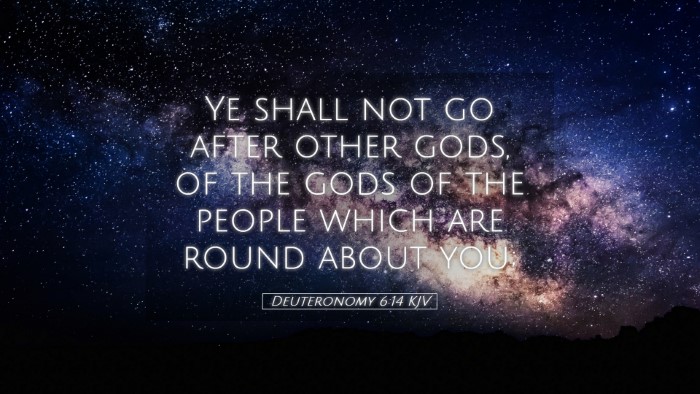Commentary on Deuteronomy 6:14
Verse Reference: Deuteronomy 6:14 - "Ye shall not go after other gods, of the gods of the people which are round about you."
Introduction
This verse is situated within a broader framework of divine instruction given to the Israelites. The context of Deuteronomy highlights themes of covenant loyalty and the exclusivity of worship due to God. Commentators have extensively reviewed the implications of adhering strictly to this command, especially in the context of ancient Near Eastern religion and culture.
Expository Insights
1. The Danger of Idolatry
Matthew Henry emphasizes the pervasive influence of surrounding nations and how the Israelites are cautioned against their customs. He notes that the worship of false gods can subtly infiltrate a community and lead to spiritual decay. This is not merely an isolated warning but a concern for preserving the integrity of worship directed exclusively towards God.
2. The Exclusivity of Worship
Albert Barnes points out the requirement for the Israelites to be distinct from the surrounding peoples. The command serves to reinforce the uniqueness of their covenant relationship with Yahweh. Pagan worship practices were an affront to their covenant and could provoke God’s jealousy, a theme prevalent throughout Israelite scripture.
3. Cultural Implications
Adam Clarke observes the cultural context in which this command was given. The Israelites were entering a land filled with nations that worshipped myriad gods. Clarke reflects on the necessity of this command as a protective measure for the spiritual well-being of the Israelite nation. The allure of local gods, associated with fertility, prosperity, and military success, posed a significant temptation that needed to be addressed thoroughly.
Theological Reflections
1. God’s Jealousy
The mention of not pursuing foreign gods underscores the theological principle of God’s jealousy for His people. Henry articulates how this divine jealousy is rooted in love, desiring the best for His children. The exclusivity God demands is not arbitrary but reflects His commitment to the covenant relationship established with Israel.
2. The Nature of True Faith
This command sharply delineates the nature of true faith and devotion, according to Barnes. Faith, in a biblical sense, involves not just belief but active loyalty and worship. Turning to other gods represents a fundamental breach of faith, signifying a relinquishment of trust in God’s providence.
3. Historical Context
Clarke's insights extend to the historical context, reminding readers that this injunction was pertinent as Israel was on the brink of occupying a land that would test their fidelity. The gods of Canaan included Baal and Asherah, whose worship rituals were seductive and often involved immoral practices that stood in stark contrast to the moral and ethical teachings of the Law.
Practical Applications
1. Contemporary Idolatry
The warning against following other gods resonates deeply within modern contexts. Henry suggests that while people today may not worship stone or wood, many individuals and communities pursue modern "gods" such as wealth, power, and fame. The principle remains—the heart is prone to seek fulfillment in various forms that steer one away from God.
2. Community Vigilance
Barnes advocates for communal vigilance against influences that divert from God’s commands. Spiritual leaders and congregations must remain alert to secular ideologies and pressures that may erode foundational beliefs. The collective worship of God within the community acts as a safeguard against individual deviations.
3. Strengthening Covenant Relationship
This verse serves as an exhortation to strengthen one’s covenant relationship with God through regular prayer, study of the Scriptures, and devotion. Clarke highlights the importance of cultivating an environment where God's presence and His commands are central to the community's life. This includes regular assembly for worship and teaching, reinforcing the significance of God’s law in daily living.
Conclusion
Deuteronomy 6:14 encapsulates a critical element of the covenant community's identity—worship should be directed solely towards God, without deviation towards foreign deities. The insights drawn from public domain commentaries by Henry, Barnes, and Clarke collectively underscore the timeless relevancy of this command. It serves as both a warning and a guide, reminding believers across generations of the importance of true allegiance to their Creator.


